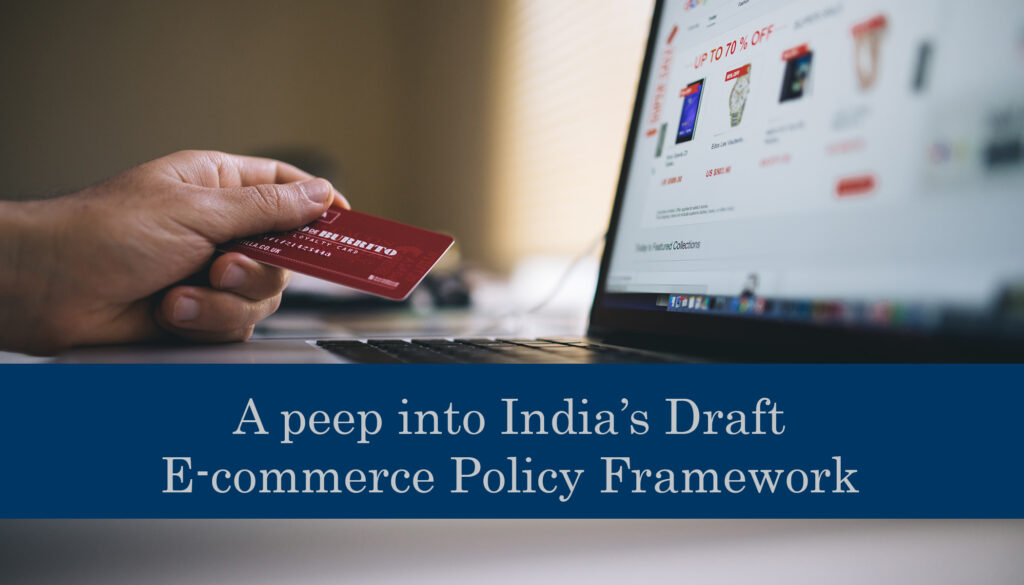A peep into India’s Draft E-commerce Policy Framework

As India prepares to roll out its formal e-commerce policy, there is a Draft Framework (“Framework”) issued by the Ministry of Industry and Commerce, which is being debated threadbare by various stakeholders.
The Framework, if adopted in its current form will significantly change the way e-commerce companies in India are presently doing their business – from supply chain to sales to data storage.
Some of the key highlights of the Framework are listed below.
A more detailed blog will follow once the final e-commerce policy is made available.
Robust regulatory framework or significant business roadblock?
- All e-commerce operators, whether domestic or foreign will have to mandatorily register themselves with the Central Consumer Protection Authority (proposed Nodal Agency).
- E-commerce entity/ies will be required to fully disclose the purpose and use of the data collected to the consumer in a simplified and easy to understand form on their websites.
- There are plans to enact a suitable legislation for providing adequate legal protection to Domain Name owners from lookalikes of trademarks and copyrights.
Data localisation
Personal data or community data collected by “internet of things” devices in “public space” will need to be stored in India. Other data, which have no personal or community implications, can be stored anywhere. However, it suggests a two-year sunset period before making data localisation mandatory. Government can access data stored in India for national security, public policy subject to privacy, consent etc.
Restrictions on deep discounts
The recommendations in the policy include barring group companies of e-commerce players from “directly or indirectly influencing” sale prices and suggests a sunset clause for deep discounting, suggesting a “maximum duration” be set for “differential pricing strategies”.
If implemented, this suggestion will adversely affect the e-commerce firms, which announce discounts to boost and drive their sales.
100% Swadeshi marketplaces to hold inventory
The sale of domestically produced goods through online platforms would be promoted by allowing limited inventory-based B2C model, wherein 100% made in India products would be sold through platforms whose founder/ promoter would be a resident Indian, the platform company would be controlled by Indian management and foreign equity would not exceed 49 percent.
Simplified GST procedures
The Framework has also favoured simplified GST procedures for e-commerce by allowing centralized registration instead of local registration and displaying requirement for each place of business.
While the Justice Srikrishna Committee, through its report has made its recommendations on protecting personal data/privacy in the digital environment addressing some crucial aspects of the digital economy, and while many are being addressed through the recently introduced Personal Data Protection Bill, 2018, many gaps related to other areas of the digital economy are yet to be addressed. The Draft e-commerce policy is expected to identify those gaps and bridge it. It should enable the country to benefit from the rapid digitization of the domestic, as well as the global, economy.
We are hoping the formal policy will be out soon. Stay tuned for our next post once the policy is out.
Authors:
- Antara Dasgupta, Senior Manager, Legal Operations
- Sristy Ghosh, Legal Associate
Disclaimer
All material included in this blog is for informational purposes only and does not purport to be or constitute legal or other advice. The Blog should not be used as a substitute for specific legal advice. Professional legal advice should be obtained before taking or refraining from an action as a result of the contents of this blog. We exclude any liability (including without limitation that for negligence or for any damages of any kind) for the content of this blog. The views and opinions expressed in this blog are those of the author/(s) alone and do not necessarily reflect the official position of Lexplosion. We make no representations, warranties or undertakings about any of the information, content or materials provided in this blog (including, without limitation, any as to quality, accuracy, completeness or reliability). All the contents of this blog, including the design, text, graphics, their selection and arrangement, are Copyright 2018, Lexplosion Solutions Private Limited or its licensors.
ALL RIGHTS RESERVED, and all moral rights are asserted and reserved.